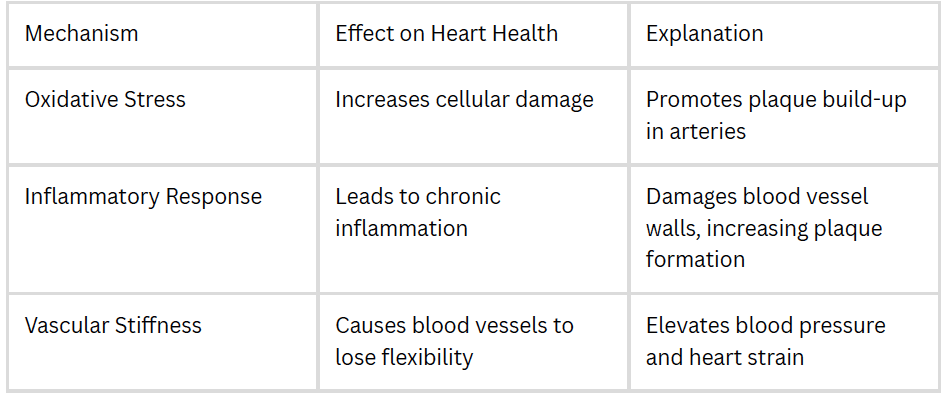How Advanced Glycation End Products (AGEs) Impact Your Heart Health
1. What are AGEs?
DefinitionAdvanced Glycation End Products (AGEs) are harmful compounds that form when proteins or fats combine with sugar in the bloodstream through a process called glycation. AGEs are produced both inside the body and from consuming certain foods, especially those cooked at high temperatures, such as grilled, fried, and roasted foods.
How AGEs are Formed
Endogenous Formation: Inside the body, AGEs form when blood sugar levels are high, especially for prolonged periods.
Exogenous Sources: Foods high in AGEs include processed foods, meats, and items cooked at high temperatures.
Did You Know?AGEs accumulate in the body over time, and higher levels are often found in older adults and individuals with diabetes or chronic diseases.
2. Why Should You Be Concerned About AGEs?
AGEs contribute to the progression of cardiovascular diseases by damaging cells and tissues. But how exactly do they affect your cardiovascular system?
A. AGEs and Oxidative Stress
AGEs promote oxidative stress, a condition where free radicals damage cells, including those in your blood vessels.
This oxidative damage can impair blood vessel function and promote atherosclerosis (plaque build-up), a major risk factor for heart disease.
B. AGEs and Inflammation
AGEs activate inflammatory pathways in the body, leading to chronic inflammation.
Chronic inflammation damages blood vessel walls, making it easier for plaque to form, narrowing arteries and increasing cardiovascular risk.
C. AGEs and Stiffening of Blood Vessels
AGEs cross-link with collagen in blood vessel walls, reducing their elasticity and causing them to stiffen.
Stiffarteries force the heart to work harder, increasing blood pressure and strain on the cardiovascular system.
3. How Do AGEs Impact Cardiovascular Health?
AGEs contribute to cardiovascular health issues through the following mechanisms:
4. How Can You Reduce AGEs in Your Diet and Lifestyle?
A. Adjust Your Cooking Methods
Avoid high-temperature cooking: Try steaming, boiling, or slow cooking instead of frying, grilling, or roasting.
Choose Fresh Foods: Processed foods often contain higher levels of AGEs. Opt for fresh fruits, vegetables, whole grains, and lean proteins.
B. Dietary Choices to Reduce AGE Formation
Increase Antioxidants: Foods rich in antioxidants, such as berries, leafy greens, and nuts, can help neutralize oxidative stress caused by AGEs.
Limit Sugar and Refined Carbohydrates: High blood sugar accelerates AGE formation. Aim to reduce your intake of sugary foods, sodas, and refined carbs.
Did You Know?AGE levels can be influenced by your lifestyle choices, and adopting an anti-inflammatory diet can significantly reduce AGE accumulation.
5. Talk to Your Healthcare Provider
If you're concerned about the impact of AGEs on your cardiovascular health, consider discussing this with your healthcare provider. They can help you assess your risk factors, recommend dietary and lifestyle changes, and explore testing options, such as blood tests to measure AGE levels, to better understand and manage your cardiovascular health.
Quick Tips for Reducing AGEs
Choose cooking methods like steaming or boiling.
Eat a diet rich in antioxidants, like berries, nuts, and leafy greens.
Limit processed foods and refined sugars in your diet.
Reference
Singh, R., et al. (2001). Advanced Glycation End-products: A Review. Diabetologia, 44(2), 129-146. Diabetologia Journal.
Uribarri, J., et al. (2010). Advanced glycation end products in foods and a practical guide to their reduction in the diet. Journal of the American Dietetic Association, 110(6), 911-916. Journal of the American Dietetic Association.
B. Dietary Choices to Reduce AGE Formation
Did You Know?AGE levels can be influenced by your lifestyle choices, and adopting an anti-inflammatory diet can significantly reduce AGE accumulation.
5. Talk to Your Healthcare Provider
If you're concerned about the impact of AGEs on your cardiovascular health, consider discussing this with your healthcare provider. They can help you assess your risk factors, recommend dietary and lifestyle changes, and explore testing options, such as blood tests to measure AGE levels, to better understand and manage your cardiovascular health.
Quick Tips for Reducing AGEs
Reference
Singh, R., et al. (2001). Advanced Glycation End-products: A Review. Diabetologia, 44(2), 129-146. Diabetologia Journal.Uribarri, J., et al. (2010). Advanced glycation end products in foods and a practical guide to their reduction in the diet. Journal of the American Dietetic Association, 110(6), 911-916. Journal of the American Dietetic Association.

